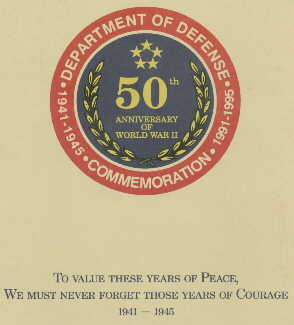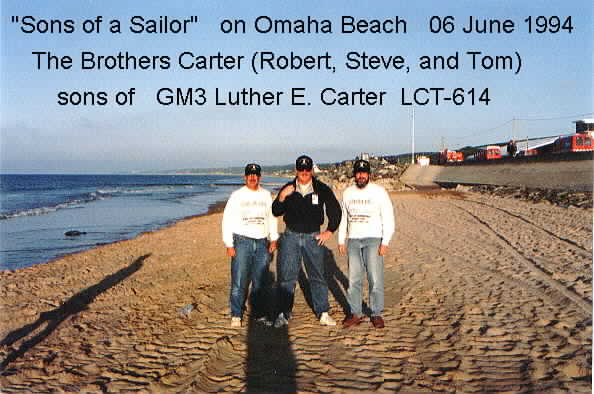

D-Day 50th Anniversary Photos and
mementos 



 |
 |
NOTE: This article was written in May 1994 for publication in the Daily-Citizen News, a daily newspaper in Dalton, GA. The article was later published as part of the paper's D-Day 50th Anniversary edition.
SONS OF A SAILOR
Revisit Normandy on D-Day plus fifty years.
by
ACC(AW) Stephen P. Carter, USNR
I'm sure on that day, he wondered why he ever did it; lied about his age to get into the U.S. Navy, and into World War II. Well, there he was, Luther E. Carter, age sixteen, manning a 20MM cannon aboard an LCT ( Landing Craft Tank ) at Omaha Beach, June 6, 1944.
As kids, my brothers, sister and I always thought our dad was something special. After all he had two birthdays, May 18, 1926 (...his Navy birthday), and September 29, 1927 (...his real birthday). Dad, like many of his generation, listed an 'embellished' date of birth in order to enter the Armed Forces.
But there on the beaches of Normandy, France, with artillery, machine gun, and small arms fire flying in all directions, and with wreckage of equipment and bodies of other young Americans strewn on the beach and in the water, I can only imagine that one particular sixteen year-old matured quite rapidly. I remember when Dad would talk about his experiences on D-Day, he would emphasize how he and his buddies on the LCT614 made two landings on Omaha Beach that day, with only one of the crew being slightly wounded. Only if we caught him in the proper mood would Dad speak of the horrors of war that he had witnessed that day.
Our father often spoke of one day returning to the Normandy region of France, for he wanted so much to visit the area in peacetime. However, on September 18, 1984, just eleven days before his 'real' fifty seventh birthday, Dad passed away after a long battle with cancer.
In June of 1984, the world was poised to celebrate the 40th anniversary of the Battle of Normandy. Dad's cancer and its radical treatment was taking its toll on his body, but his mind remained strong and sharp. In the days encompassing the anniversary of D-Day there were numerous news reports and network specials dealing with the events in France, and Dad became totally engrossed in all of this programming. We, too, were very interested in all of this, for we knew what an important event this was in his life. When these reports were on, we couldn't help but watch the television with one eye, and watch Dad with the other. It was obvious that he would have given anything to be there in Normandy with his shipmates and fellow veterans. Had his health been such that he could, we would have done whatever was needed to get him there.
In light of the approaching 50th anniversary of the Battle of Normandy, and knowing how very much our father wanted to return to the site of the conflict during a more peaceful time, my brothers Robert and Tom and I decided to travel to France for the anniversary ceremonies. So, with the support of our mom, Alta, and our sister, Betsy, we set into motion our planning for the journey.
After our initial discussion of this trip, we decided that the prime objective of the mission would be to be at the site of landing of the LCT614 at H-Hour, of D-Day, fifty years to the minute later. This, however, created one big question. Where was that site? We knew that Dad's LCT landed at Omaha Beach, but in which sector? ( There were eight sectors.)
At that point we realized that we knew much less than we had imagined about Dad's activities on D-Day, and that we had much research ahead of us. We had no idea, however, how interesting and rewarding all of this research would be. The information that we have uncovered makes us even more proud of Dad and his shipmates aboard the LCT614.
Mom and Betsy started the research ball rolling by digging through Dad's photographs and Navy records that were at home filed away in boxes and forgotten desk drawers. Among those items were photos of the LCT614 crew and Dad's " D-Day Diary", his personal account of the invasion. Robert and Tom, both being educators by profession, have handled the bulk of the real detective work. Last year they traveled to the National Archives in Washington, D.C. and discovered a wealth of information from deck logs, action reports, and such. I, on the other hand, being an employee of the Federal Aviation Administration and in the transportation 'biz', so to speak, have become the logistics officer of this mission. My primary job has been to make all of the travel arrangements, but I have been able to do some of the research as well.
Through all of this gold mine of information that we have uncovered, Tom was the one who really hit the mother lode. He was able to take the crew records that he and Robert discovered in the National Archives, and compare that information with other clues such as names and hometowns on the back of fifty year old photographs. Armed with this information and microfilmed phone books from the University of Tennessee library, Tom located five of Dad's shipmates from the LCT614, including the Skipper. These gentlemen have been an invaluable source of information as to the activities of the vessel before, during ,and the gruelling months after the invasion. It has been a pleasure and an honor to be in contact with them.
Probably the most rewarding part of all of this research occurred just after Tom located these crewmen. As I mentioned before, one of the crew was wounded during the first of two landings that the LCT614 made on D-Day. Fireman Second Class John G. Jarvis was standing behind the wheelhouse of the landing craft next to the skipper, Ensign Donald E. Irwin, as the men and equipment were being offloaded from the deck. A German 88MM artillery round impacted the water just off the starboard side of the vessel, and a piece of shell fragment hit Jarvis just below the eye. The impact knocked Jarvis off of his feet, and Ens. Irwin caught him as he went down. After being treated by Irwin and other crew members, Jarvis returned to his duties for yet one more landing on Omaha Beach that day. Later in the evening, the LCT614 went alongside a British hospital ship and Jarvis was transferred aboard for further treatment. However, in all of the confusion of the day's activities, Ens. Irwin inadvertently left Jarvis' name off of the casualty list as being wounded in action. As a result, John Jarvis never received the Purple Heart awarded to those who are wounded in combat.
Donald Irwin was the first of the LCT crewmen that Tom located. When Tom located John Jarvis some weeks later, he advised Mr. Irwin, who was ecstatic over the news. Mr. Irwin said that he had " pangs of guilt " for decades over having left Jarvis' name off of the official list of wounded in action, because he knew that Jarvis deserved the Purple Heart. Now, he had the opportunity to rectify the situation, albeit fifty years late. Mr. Irwin, a resident of Iowa, immediately enlisted the assistance of Iowa Senator Charles Grassley, and an old friend, Maj. Gen. Evan "Curly" Hultman of the Reserve Officers Association to cut through the government red tape. Tom also contacted Georgia Senator Sam Nunn to help in the Jarvis case, and one week before Christmas 1993, Mr. John G. Jarvis was awarded the Purple Heart he so richly deserved.
We are constantly in search of sources of information regarding the invasion and Dad's ship. In February of 1994 we discovered the existence of a group of WWII LCT seamen that reunite each year somewhere in the U.S. The LCT Flotillas of World War II is made up of LCTers from both the European and Pacific theatres of operation, and their 1994 reunion was to take place in Nashville, Tennessee. I considered this a stroke of very good luck, since my wife, Tracy, and I now live in Nashville. I contacted the organizer of the event, a Mr. Bud Farmer, also of Nashville, and asked if I could attend some of the functions in hopes of meeting some of the men from Dad's flotilla ( Flotilla 12 ). He was very happy to hear from me, and he not only invited me to all of the group's functions, but he put me to work. Mr. Farmer was also a veteran of the Normandy invasion, and it was indeed a pleasure to help him pull the reunion off.
At the reunion, I met several of the men from Flotilla 12, including the man who was Dad's Group Commander in the days following D-Day, when the LCT614 was assigned duty in the British sector of the invasion area ( Gold, Sword, and Juno Beaches). Mr. Dean Rockwell turned out to be a very multifaceted individual. He not only was a valuable source of information about Flotilla 12 on D-Day, but was very knowledgeable on many subjects, especially college athletics. For instance, one of the many things that I discovered about him was that he was the coach of the 1964 U.S. Olympic Wrestling Team. At age 82, he is more active than people half his age. In fact he has organized, and is personally leading a tour to Normandy for the 50th anniversary. We plan to meet him for dinner in Paris the evening before we return to the U.S.
The experience of the LCT Flotillas Reunion is one that I will never forget. Even though we were a generation apart, they readily accepted me into the fold. A few of the guys were from Dad's flotilla, but none remembered him. However, on the first evening of the reunion, at dinner, Mr. Farmer made me stand by my table, as he explained to the group who I was, why I was there, and all about Dad and the '614'. Afterward, a Dr. Floyd Wallace from Michigan came up to me and said," I knew your dad at Solomons, Maryland." (...an Amphibious Forces training base during WWII.) It got real emotional after that.
On May 31, 1994 Robert, Tom, and I will fly from Atlanta to London. We will spend two days along the southern English coast where Dad and tens of thousands of other young men gathered for the invasion of Europe. Then on the morning of June 3, we will take a ferry across the English Channel to France, closely paralleling the route of the 1944 invasion force.
If all goes as planned, on June 6, 1994, at 0630 hours ( H-Hour of D-Day plus fifty years to the minute ), we will be standing in the Dog Red sector of Omaha Beach, Normandy, France. There will be thousands of veterans of the battle, plus three sons of a sailor from Chatsworth, Georgia in attendance. I can't help but think that we will be joined by the spirits of those D-Day veterans who did not live to see this day, whether they died in the war or in the years that followed. I know my dad will be there.

Tom Carter Julieroo57@aol.com
Steve Carter 200sc-carter@email.msn.com